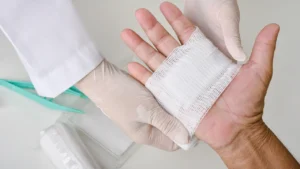Foot wounds are a common yet serious concern for individuals with diabetes. Diabetes, particularly when left unmanaged, can lead to complications that result in foot wounds that won’t heal. These non-healing wounds can increase the risk of infection, gangrene, and even limb amputation. Orthopedic treatment plays a crucial role in managing these foot wounds, preventing infections, and improving mobility. At Tec Orthopedics, we specialize in providing expert care to individuals suffering from diabetic foot wounds, helping them heal and regain their independence.
The Link Between Diabetes and Foot Wounds
Diabetes can affect various aspects of your health, but one of the most concerning areas is your feet. The two primary issues that cause foot wounds in individuals with diabetes are poor circulation and neuropathy. High blood sugar levels over time can damage blood vessels, reducing blood flow to the feet, which makes it harder for wounds to heal. Neuropathy, or nerve damage, reduces sensation in the feet, meaning a person may not feel a wound or infection until it has worsened. Together, these factors significantly increase the risk of diabetic foot complications like non-healing wounds, infections, and ulcers.
What Are Diabetic Foot Wounds?
Diabetic foot wounds typically refer to diabetic ulcers, which are open sores or wounds that develop on the feet of individuals with diabetes. These wounds can develop from minor cuts, blisters, or pressure sores that go unnoticed due to decreased sensation in the feet. The most common types of foot wounds in diabetes include:
- Pressure ulcers: These occur when prolonged pressure affects areas of the foot, causing the skin and tissues to break down.
- Diabetic ulcers: A result of poor circulation and neuropathy, these ulcers are prone to infection and are difficult to heal.
Non-healing foot wounds are a serious concern, as they can lead to infections and even gangrene if not treated promptly and effectively.
The Role of Orthopedic Treatment in Managing Foot Wounds
Orthopedic treatment is essential for managing foot wounds in diabetes. It focuses on promoting healing, reducing pain, and preventing further complications. Orthopedic specialists utilize various techniques to ensure proper healing, such as:
- Pressure relief: Proper footwear and custom orthotics are designed to alleviate pressure on the affected area, preventing further tissue damage.
- Proper foot support: Orthopedic treatments ensure that the feet are properly supported to enhance mobility and improve circulation to the wound site.
- Customized orthotics: These devices help distribute weight evenly across the foot, which is crucial in preventing the worsening of foot wounds.
By addressing the root causes of delayed healing, orthopedic care is key in stopping the progression of wounds and encouraging recovery.
Key Approaches in Orthopedic Foot Wound Care
Effective orthopedic care involves several key approaches aimed at healing foot wounds and preventing further damage:
- Infection prevention and management: Wound care specialists use advanced techniques to keep wounds clean and prevent infections, which are common in individuals with diabetes.
- Tissue preservation: Preserving healthy tissue around the wound is crucial for preventing the spread of infection and ensuring the best chance for healing.
- Pressure relief techniques: Customized shoes, foot orthotics, and cushioned pads help reduce pressure on vulnerable areas of the foot, supporting the healing process.
- Improving mobility: Orthopedic treatments focus on improving mobility by supporting proper foot function and alignment, which is vital for individuals with diabetes who may also have limited mobility.
Benefits of Orthopedic Treatment for Non-Healing Foot Wounds
Orthopedic treatment provides numerous benefits for individuals with non-healing foot wounds due to diabetes:
- Prevention of infection and gangrene: Orthopedic care helps control and manage wounds before they lead to serious complications like infections or gangrene.
- Enhanced wound healing: By reducing pressure and improving circulation, orthopedic care promotes faster and more effective wound healing.
- Improved mobility: With proper foot support, individuals can move more easily and avoid further damage to their feet.
- Tissue preservation: Orthopedic treatments focus on preserving healthy tissue, reducing the risk of tissue loss and limb amputation.
How Tec Orthopedics Specializes in Diabetic Foot Wound Care
At Tec Orthopedics, we provide comprehensive care for diabetic foot wounds, focusing on the specialized needs of individuals with diabetes. Our team of experts employs the latest techniques in Orthopedic Treatment for Foot Wounds that Won’t Heal in Diabetes, ensuring the best possible outcome for each patient. From customized orthotics to advanced wound care solutions, we work closely with our patients to develop personalized treatment plans that address their unique conditions.
When to Seek Orthopedic Treatment for Foot Wounds in Diabetes
It’s important to seek professional care as soon as you notice a foot wound that’s not healing or showing signs of infection. Signs that indicate you should seek orthopedic treatment include:
- Persistent pain or swelling in the feet
- Redness, warmth, or unusual discharge around a wound
- Difficulty walking or standing due to foot pain
- Wounds that do not improve with basic self-care
Prompt orthopedic intervention is essential to prevent complications such as infections or gangrene.
Takeaway
Managing diabetic foot wounds requires specialized care to ensure they heal properly and do not lead to more severe complications. Orthopedic treatment plays a pivotal role in preventing infections, improving mobility, and preserving tissue integrity. If you or a loved one is struggling with non-healing foot wounds, it’s important to seek expert care to manage the condition and support healing. At Tec Orthopedics, we specialize in providing orthopedic care for diabetic foot wounds, ensuring you receive the best treatment available for improved health and quality of life.






